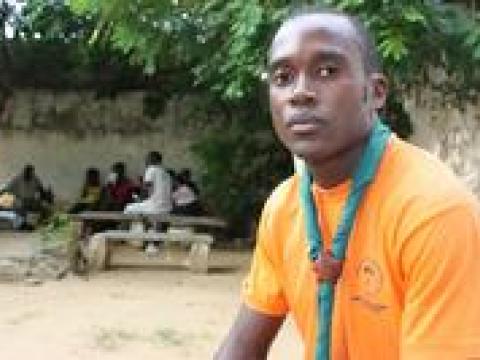Being a Scout in Angola [A special report]

Like many Angolans, Pedro Fernandez, a 26-year-old Scout, oozes an aura of patience and stoicism. His buoyant demeanour can almost make you forget that when he was born, a deadly civil war had engulfed his country. Worse still, when he was 3-years-old, what is ostensibly the second largest battle in the history of Africa took place in Angola’s Cuando Cubango province (from January 13 to March 23, 1988). However, later on, all is well that ends well, the 2000s -- in this south-central African country, the second-largest producer of oil in sub-Saharan Africa after Nigeria -- saw the end of a 27-year-long civil war (1975–2002).
Today, Pedro is a 4th Year student, majoring in electronic engineering at Universidade Técnica de Angola. On Saturday 9 April 2011, after nearly a week working with Angolan Scouts on the preparations of the next regional conference, Chief Commissioner António Silvestre Sardinha took me to visit Scout Group no. 139, to which Pedro belongs. On our way, on the bustling Viana highway, when engarrafamento (traffic jam) became a reality, we took to its logical extreme, the cliché “don’t just sit there, do something!”
And so, I started the interview with António, in the car.
I learnt that the Portuguese introduced Scouting to Angola in the 1930s. However, after independence, Scouting stopped partly because of the civil war but also due to an ideological system of government of the day that was not conducive for the Movement.
Scouting was revived in 1991. That year in May, the Angolan National Assembly had passed law 12/91, defining Angola as a "democratic state based on the rule of law" with a multi-party system. A system that would tolerate outfits such as the Scout Movement.
There are more than 15,000 Scouts in Angola, in 18 provinces, 618 comunas and 173 municipalities. One unique feature of Scouting in Angola is that most units are based at churches. 139th is based at Nossa Senhora de Rosaria parish, while 12th, another group is based at Nossa Senhora de Nazaré.
Meanwhile, a colleague, Srinath Tirumale, was also in Angola on a fact-finding visit with regards to the Scouting in School programme scheduled to roll out in the country in the foreseeable future. Srinath and the team met with the Vice Minister for Education, Ana Paula Inês Ndala. The Vice Minister, who said the initiative came at a good time, promised that an MoU would be signed, so as to outline the specifics of this joint initiative. The team also visited a Teacher’s college, one of the many possible loci for this venture.
The resilience and hope on Pedro’s face are coincidentally reminiscent of the role of Scouting in the community the during the war period. “In 1992 Angolan Scouts assisted IDPs who were moving from Bengo to Luanda. They set up refugee camps and supported a hospital for refugees in conjunction with Red Cross”,Chefe António confirmed. He also noted, “Furthermore, in Malange, Scouts ran community kitchens for the IDPs between 1992 and 1994.” Many IDPs got their meals from these kitchens.
Asked about his thoughts about the impact Scouting on his life, Pedro says, without a doubt in his Scout mind, “I like Scouting, I cannot leave Scouting! It changed my life. For example, before joining I was very shy. But now, after joining, I am very good at speaking in public. Scouting is a school!”
Scouting has also had an impact on another Angolan young man. Domingo Savonde Katito, 22, is married to a fellow Scout, and they have a 6-month-old baby girl! He says, “Before joining Scouting, I had no focus. I spent most of my time in the streets. I didn’t go to church. But now, I have a purpose in my life, and I am a responsible father.”
Zooming on the beachside highway at sunset on the eve of my departure from Angola, listening to Kizombatunes, with Benja Setula – a young lawyer in Luanda with his own firm, a Scout, and the Youth Programme Commissioner – the beautiful horizon conjures up an imagination of limitless possibilities. Possibilities of country on the move, albeit with many socio-economic challenges, possibilities of Scouting in terms of impacting lives of young Angolans, possibilities of the Scouting in School programme, and of course, possibilities of a successful Scout Year in 2012! Scoutmania fever is already in the Angolan air!
In 2012, all eyes will be on Angola. The Associação de Escuteiros de Angola, will host the Africa Scout Regional Conference (6 - 9 June), Africa Scout Day (13 March) and the Youth Forum (1 - 4 June).
If you will be coming to Angola in 2012, this could turn out to be one of those moments you don’t want to forget. The beauty of the country, the unique courtesy of the people and their culinary prowess, will make you want to come back.
Bem-vindo à Angola!
Report by eishimwe@scout.org
Picture: Pedro Fernandez, "Scouting changed my life", © WSB/ARO Euloge